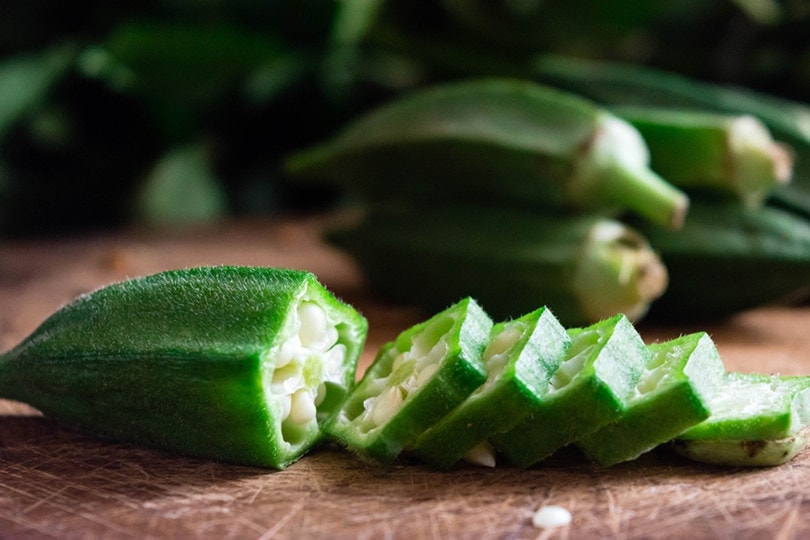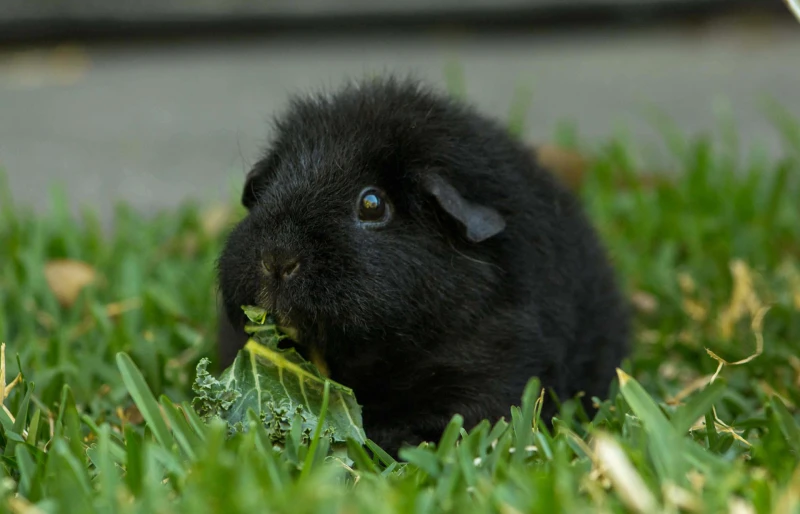Can Guinea Pigs Eat Okra? Vet-Reviewed Facts & Safety Guide
Updated on

Click to Skip Ahead
Regardless of the species, feeding your pet comes with several do’s and don’ts that are essential to be familiar with. After all, you want your pet to remain healthy and happy over the course of their lifetime.
If you’ve been wanting to add okra to your guinea pig’s diet but aren’t sure if it’s a suitable vegetable for cavies, know that okra is safe for guinea pigs but only in moderation.
Let’s get into the details about guinea pigs and okra, including the pros and cons for your cavy and how much is okay to feed them.
The Health Benefits of Okra
Okra (Abelmoschus esculentus) is grown in warm, tropical locations, including Africa and South Asia. While it is a fruit, it is traditionally cooked and used as a vegetable. Okra is also known as “lady’s fingers” and is available in red and green, though most people are more familiar with the green variety.
It is quite popular in South American dishes and is commonly used in gumbo. That said, it’s not for everyone due to its relatively slimy texture. But okra has several nutritional benefits.

Vitamins and Minerals
Okra is high in various vitamins and minerals.
- Calories: 33
- Carbohydrates: 7 grams
- Protein: 2 grams
- Fiber: 3 grams
- Calcium: 82 mg
- Magnesium: 57 mg
- Folate: 60 ug
- Vitamin A: 36 ug
- Vitamin C: 23 mg
- Vitamin K: 31.3 ug
It is low in carbohydrates and calories but is quite high in vitamins C and K.
Antioxidants
Okra contains polyphenols and vitamins A and C. These are all high in antioxidants, which have health benefits in humans.
The Negatives of Okra

Okra definitely has positive nutritional value, but there are a few negatives to be aware of.
Urinary Stones
Okra contains oxalates, which bind to the calcium in the urine and increase the risk of urinary stones. It has a relatively high number of oxalates: a cup of okra contains 317 mg. If your cavy regularly eats okra, it could lead to urinary stones.
- Straining to urinate
- Blood in the urine
- Signs of pain (hunched posture, grinding teeth, vocalizing while urinating)
- Produces little to no urine
- Lethargic
- Depressed
The stones are also usually made of calcium, which Okra also contains. It is advised to be mindful of guinea pig’s total calcium intake to avoid urinary stones, as excess calcium will be excreted in the urine.
Diarrhea
Guinea pigs are prone to diarrhea, particularly young pigs, but they can get it at any age. Eating something like okra, especially if they eat too much, can also cause a dietary imbalance, which might lead to diarrhea.
In such a small animal, diarrhea can quickly lead to dehydration and death.
- Loose, smelly stool
- Staining around the anus
- Swollen belly
- Lethargy
- Loss of appetite
- Rapid breathing
- Poor hair coat
Your guinea pig will need to see a vet urgently for treatment, which can include rehydration with fluids under the skin.
How Much Okra Can You Feed Your Guinea Pig?
Guinea pigs shouldn’t eat okra more than once or twice a week. You should only give your cavy a small piece cut up into tiny enough parts to make it easier for them to eat.
This also will allow your cavy to eat just a tiny bit and you can keep an eye on them for any digestive trouble for the next 24 hours.
But whether your guinea pig will want to eat the okra is another story. Since it’s on the slimy side, some guinea pigs won’t likely be all that interested in it, anyway.

Fruits and Vegetables That Are Safe for Guinea Pigs
The main component of the guinea pig’s diet is grass hay, to which they should have unlimited access. You should also feed guinea pig pellets to cavies, but only about 1–2 tablespoons a day.
- Carrots
- Cilantro
- Clover
- Dandelion greens
- Parsley
- Romaine lettuce
- Tomatoes
They should eat 1/2 to 1 cup of two to three different kinds of veggies daily. Just be sure to introduce one vegetable at a time and very slowly, so you can avoid stomach upset.
Fruit is considered a treat (and don’t forget that okra is a fruit) and should only be given on occasion. Too much will cause stomach upset. But the following are acceptable fruits for guinea pigs:
- Apples
- Berries
- Cantaloupe
- Kiwi
- Pineapple
Conclusion
It’s essential that your guinea pig is fed a diet that will keep them healthy. While okra will add nutritional benefits to their diet, they can get the same benefits from more acceptable fruits and vegetables.
While okra isn’t toxic to guinea pigs, there are a few concerns about the oxalates that it contains and your cavy’s digestive system. Also, many guinea pigs dislike okra. But you can try giving a little okra to your cavy, anyway.
If they like it, remember to only give them a small piece, no more than twice a week. You can also speak to your vet about your guinea pig’s diet if you’re at all concerned.
Featured Image Credit: sta-panteris, Pixabay












